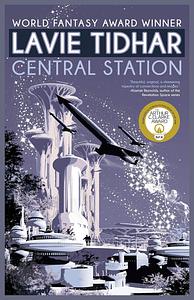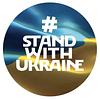Take a photo of a barcode or cover
An interesting premise and great world building. But then the book ends abruptly and without resolving many of the unanswered questions.
A beautifully written and imaginative novel, Tidhar's prose is meticulously crafted and gleaming. But Central Station's status as set of stitched short stories results in uneven pacing, plotting, and character development.
mysterious
medium-paced
Plot or Character Driven:
A mix
Strong character development:
Yes
Loveable characters:
Yes
Diverse cast of characters:
Yes
Flaws of characters a main focus:
Complicated
Vo veľmi ďalekej budúcnosti stojí v Izraeli Central Station, ktorou sa ide Up and Out - do vesmíru a ešte ďalej. Páči sa mi Lavieho čriepkový štýl príbehu (podobné bolo aj Driftwood od Marie Brennan) - dozviete sa náhodné fakty z tohto sveta s pár ústrednými postavami.
Terrorartists, ktorí vytvárajú umelecké nekonečne opakujúce sa výbuchy (aj s ľuďmi vo vnútri). God artist, ktorý vytvára rôznych bohov. Robotnik, cyborgovaný vojak, teraz už len hrdzavie na ulici a je závislý na Faith. Doslova.
Trochu mi síce vadilo, že niektoré veci Lavie začal, ale vôbec nedokončil (ale to je skôr osobná preferencia. niekedy je dobré nechať otvorený príbeh). Chcem vedieť čo sa stane ďalej predsa! Inak veľmi dobré sci-fi.
Terrorartists, ktorí vytvárajú umelecké nekonečne opakujúce sa výbuchy (aj s ľuďmi vo vnútri). God artist, ktorý vytvára rôznych bohov. Robotnik, cyborgovaný vojak, teraz už len hrdzavie na ulici a je závislý na Faith. Doslova.
Trochu mi síce vadilo, že niektoré veci Lavie začal, ale vôbec nedokončil (ale to je skôr osobná preferencia. niekedy je dobré nechať otvorený príbeh). Chcem vedieť čo sa stane ďalej predsa! Inak veľmi dobré sci-fi.
This is a (post-)cyberpunk SF novel without a clear plotline, but with chapters (each from a new perspective), linked in a time-chain. The book was nominated for Literary and Arthur C. Clarke Awards and won John W. Campbell Memorial Award.
There is a space port in Tel-Aviv, called the Central Station. A lot of humans, robot and gods live there, both in the real world and a virtuality. The story starts with a strange boy, who by his will power / magic / whatever changes the reality around, e.g. “A thin, glittering membrane, like a soap bubble, appeared between his fingers, the boy secreting power and manipulating atoms to form this thing, this protective snow globe, capturing within it the single drop of rain. It hovered between his fingers, perfect and timeless.”
He is waiting there every Friday with his caretaker, Mama Jones, for his father, for he has to return before Shabbat. He continues to wait even despite the fact that he knows that he is vat-grown, lab-born. And this time he is successful, for a man comes from the space. Enter Boris Chong, a man with a Martian symbiont/parasite on his head that share his emotion, one from a big family, whose progenitor made them remember all memories of their ancestors, not only the important ones, but grocery lists… as story goes by (it is hard to say that it is progresses) we see more and more glimpses of this universe: robots, which fought in a long forgotten conflict and are now begging on the streets for spare parts; data vampires; people, who work is virtual games for a living; god-makers; collectors of garbage; messiahs.
There are some allusions to a lot of other SF works, from nine billion names of god to [b:Dune|39776179|Dune (Dune Chronicles, #1)|Frank Herbert|https://i.gr-assets.com/images/S/compressed.photo.goodreads.com/books/1523123959l/39776179._SY75_.jpg|3634639], to [b:A Princess of Mars|40395|A Princess of Mars (Barsoom, #1)|Edgar Rice Burroughs|https://i.gr-assets.com/images/S/compressed.photo.goodreads.com/books/1332272118l/40395._SY75_.jpg|1129624] to [b:The Diamond Age: Or, A Young Lady's Illustrated Primer|827|The Diamond Age Or, A Young Lady's Illustrated Primer|Neal Stephenson|https://i.gr-assets.com/images/S/compressed.photo.goodreads.com/books/1388180931l/827._SY75_.jpg|2181158] and to works of the author himself, including published after this book. The mix is interesting, it is, as others noted, somehow similar to [b:The Quantum Thief|7562764|The Quantum Thief (Jean le Flambeur, #1)|Hannu Rajaniemi|https://i.gr-assets.com/images/S/compressed.photo.goodreads.com/books/1327950631l/7562764._SY75_.jpg|9886333], which I ranked highly. What made for me this book worse than the novel by [a:Hannu Rajaniemi|2768002|Hannu Rajaniemi|https://images.gr-assets.com/authors/1300203018p2/2768002.jpg] is that there is no story, just gems and pebbles, thrown across the pages.
There is a space port in Tel-Aviv, called the Central Station. A lot of humans, robot and gods live there, both in the real world and a virtuality. The story starts with a strange boy, who by his will power / magic / whatever changes the reality around, e.g. “A thin, glittering membrane, like a soap bubble, appeared between his fingers, the boy secreting power and manipulating atoms to form this thing, this protective snow globe, capturing within it the single drop of rain. It hovered between his fingers, perfect and timeless.”
He is waiting there every Friday with his caretaker, Mama Jones, for his father, for he has to return before Shabbat. He continues to wait even despite the fact that he knows that he is vat-grown, lab-born. And this time he is successful, for a man comes from the space. Enter Boris Chong, a man with a Martian symbiont/parasite on his head that share his emotion, one from a big family, whose progenitor made them remember all memories of their ancestors, not only the important ones, but grocery lists… as story goes by (it is hard to say that it is progresses) we see more and more glimpses of this universe: robots, which fought in a long forgotten conflict and are now begging on the streets for spare parts; data vampires; people, who work is virtual games for a living; god-makers; collectors of garbage; messiahs.
There are some allusions to a lot of other SF works, from nine billion names of god to [b:Dune|39776179|Dune (Dune Chronicles, #1)|Frank Herbert|https://i.gr-assets.com/images/S/compressed.photo.goodreads.com/books/1523123959l/39776179._SY75_.jpg|3634639], to [b:A Princess of Mars|40395|A Princess of Mars (Barsoom, #1)|Edgar Rice Burroughs|https://i.gr-assets.com/images/S/compressed.photo.goodreads.com/books/1332272118l/40395._SY75_.jpg|1129624] to [b:The Diamond Age: Or, A Young Lady's Illustrated Primer|827|The Diamond Age Or, A Young Lady's Illustrated Primer|Neal Stephenson|https://i.gr-assets.com/images/S/compressed.photo.goodreads.com/books/1388180931l/827._SY75_.jpg|2181158] and to works of the author himself, including published after this book. The mix is interesting, it is, as others noted, somehow similar to [b:The Quantum Thief|7562764|The Quantum Thief (Jean le Flambeur, #1)|Hannu Rajaniemi|https://i.gr-assets.com/images/S/compressed.photo.goodreads.com/books/1327950631l/7562764._SY75_.jpg|9886333], which I ranked highly. What made for me this book worse than the novel by [a:Hannu Rajaniemi|2768002|Hannu Rajaniemi|https://images.gr-assets.com/authors/1300203018p2/2768002.jpg] is that there is no story, just gems and pebbles, thrown across the pages.
Fascinating world-building and concepts but it felt more like an exposé than a thrilling storyline.
challenging
mysterious
slow-paced
Plot or Character Driven:
Character
Strong character development:
Complicated
Loveable characters:
No
Diverse cast of characters:
Yes
Flaws of characters a main focus:
Yes
It's got some good ideas, mixed in with some kind of bad ones. Competently written but I didn't really enjoy it. Lots of ideas seemed to bubble up but ultimately not really mean anything.
I tend to prefer novels to short story collections. I don't mind a short story here or there when I'm in the mood for a shorter work, but I'm usually in the mood for the longer, deeper, more satisfying stories that come from a novel. It takes a lot for me to read a collection, and had I known that Central Station is, in essence, a short story collection, I probably would have passed on it.
To be fair, Central Station is a fix-up novel. That is, Tidhar took a series of related short stories and modified them enough to make them flow as a single novel. I've read some good fix-up novels (Foundation among them), but they never feel like a novel. Attention shifts a lot from one character to another, enough so that it's hard to stay connected to any one character enough to get the connection to the story. Tidhar uses recurring characters and families to maintain a connection, but it doesn't feel as strong as if he had used just one character.
The book focuses on Central Station, a space station in Tel Aviv around which space travelers have congregated. The story isn't about space, though; it's about those travelers and the residents of the town that remains. It takes us through the lives of a handful of characters who represent the best and worst of what's left. Cybertech is common now, enough so that cyborgs and long-lived humans exist in the story, and Tidhar shows us what humanity is by focusing on what brings us together despite our differences. Robots preach; humans fall in love with cyborgs; data vampires can still be treated with compassion.
(Yes, data vampires. This is a book that's chock full of ideas that could be novels by themselves, but Tidhar peppers them throughout the story like a seasoning. I can see the other science fiction authors out there gnashing teeth or pulling hair at how many series of books they could have written with something Tidhar throws out there just to establish setting.)
Some of the stories are better than others, which is a shame, since the book is supposed to be taken as a whole. The later stories are better than the early ones, most likely because Tidhar is developing characters we've already met, which begs the question: Do I evaluate Central Station as a novel, or as a short story collection? As a novel, it works because we do get some closure and conclusions to the characters, and I can overlook some stumbling that occurs at the start, but as a short story collection, the early stories aren't as effective. Plus, the later stories work better partly because Tidhar is relying on our already knowing the characters he's introduced in earlier stories, but how are they as standalone stories? Would I be missing out on crucial details if I hadn't read the earlier stories first?
I'm probably splitting hairs here, because Tidhar is a good writer, and he has a lot of things to say with his story (stories?). I just can't help but wish this book had been an actual novel instead of this odd mosaic of novel and short story collection. It does remind me of comic book series, though, where the overall story is broken up into different arcs. Maybe I'm just being too particular.
To be fair, Central Station is a fix-up novel. That is, Tidhar took a series of related short stories and modified them enough to make them flow as a single novel. I've read some good fix-up novels (Foundation among them), but they never feel like a novel. Attention shifts a lot from one character to another, enough so that it's hard to stay connected to any one character enough to get the connection to the story. Tidhar uses recurring characters and families to maintain a connection, but it doesn't feel as strong as if he had used just one character.
The book focuses on Central Station, a space station in Tel Aviv around which space travelers have congregated. The story isn't about space, though; it's about those travelers and the residents of the town that remains. It takes us through the lives of a handful of characters who represent the best and worst of what's left. Cybertech is common now, enough so that cyborgs and long-lived humans exist in the story, and Tidhar shows us what humanity is by focusing on what brings us together despite our differences. Robots preach; humans fall in love with cyborgs; data vampires can still be treated with compassion.
(Yes, data vampires. This is a book that's chock full of ideas that could be novels by themselves, but Tidhar peppers them throughout the story like a seasoning. I can see the other science fiction authors out there gnashing teeth or pulling hair at how many series of books they could have written with something Tidhar throws out there just to establish setting.)
Some of the stories are better than others, which is a shame, since the book is supposed to be taken as a whole. The later stories are better than the early ones, most likely because Tidhar is developing characters we've already met, which begs the question: Do I evaluate Central Station as a novel, or as a short story collection? As a novel, it works because we do get some closure and conclusions to the characters, and I can overlook some stumbling that occurs at the start, but as a short story collection, the early stories aren't as effective. Plus, the later stories work better partly because Tidhar is relying on our already knowing the characters he's introduced in earlier stories, but how are they as standalone stories? Would I be missing out on crucial details if I hadn't read the earlier stories first?
I'm probably splitting hairs here, because Tidhar is a good writer, and he has a lot of things to say with his story (stories?). I just can't help but wish this book had been an actual novel instead of this odd mosaic of novel and short story collection. It does remind me of comic book series, though, where the overall story is broken up into different arcs. Maybe I'm just being too particular.
emotional
mysterious
reflective
medium-paced
Plot or Character Driven:
Plot
Strong character development:
Complicated
Loveable characters:
Yes
Diverse cast of characters:
Yes
Flaws of characters a main focus:
Complicated
Really nice almost gentle picture of a post Earth-bound world. Full of rich detail and small mysteries. I loved it, even if I am not really sure where it ended.
This ultimately didn't amount to as much as I hoped, but the journey was worth it. Tidhar is one of the best prose stylists working in SF today, and he's also one of its more out-of-the-box thinkers. Central Station is a pastiche of a lot of time-honored SF tropes, but they're put together in an unusual way, and with a stronger sense of place than most writers can manage. RIYL PKD, Russell Hoban, Borges, etc.
At first blush this book is high-minded and intellectual and mostly about the ideas of a far-future science fiction. It takes place long past (what I understand to be) the traditional definition of the Singularity, and visits characters living in a bunch of different parts of the new structures of human (and Other) society. It briefly touches on questions about how intrinsic some of humanity's problems are, like war or prejudice, and how we're unable to overcome them even when the other parts of society become unrecognizable. It also touched on themes as humanity as a big messy family where everyone and no one tells the story and a lot of cerebral stuff.
However, certain parts of this were very goofy. There was a robot priest named Brother Patch-It heading the Church of Robot and I couldn't get this image out of my head. There was an elevator programmed to make pleasant conversation and I could have sworn it was going to say "Share and Enjoy" at the end. All the robots talk about the afterlife like they do in Red Dwarf. I find it hard to imagine these were unintentional because they're such a part of the canon. This really endeared the book to me.
However, certain parts of this were very goofy. There was a robot priest named Brother Patch-It heading the Church of Robot and I couldn't get this image out of my head. There was an elevator programmed to make pleasant conversation and I could have sworn it was going to say "Share and Enjoy" at the end. All the robots talk about the afterlife like they do in Red Dwarf. I find it hard to imagine these were unintentional because they're such a part of the canon. This really endeared the book to me.






